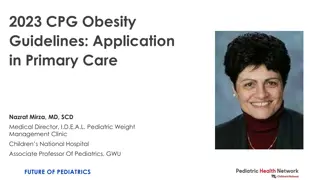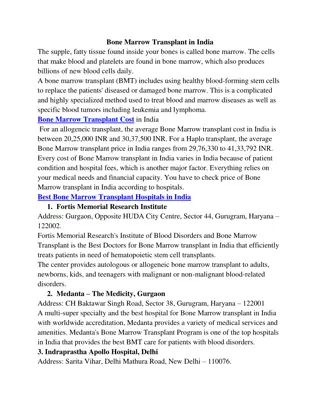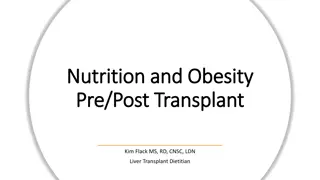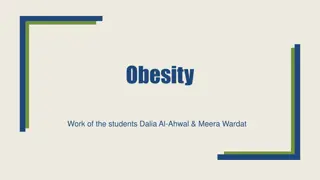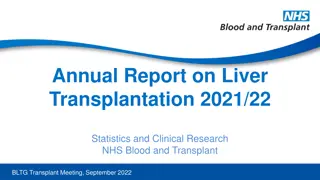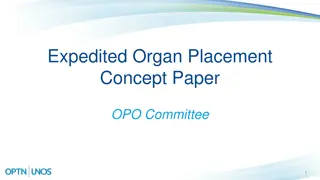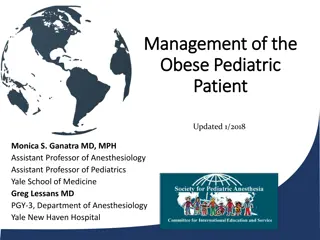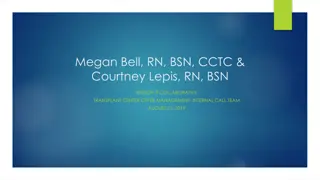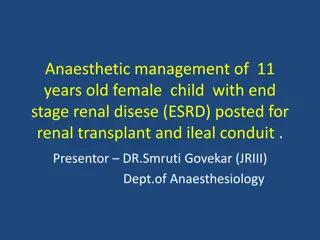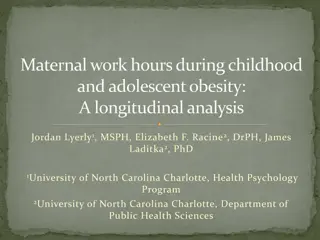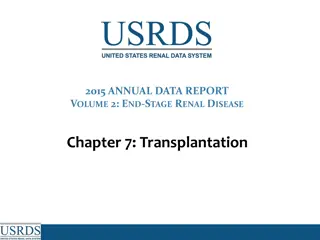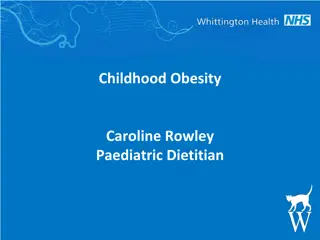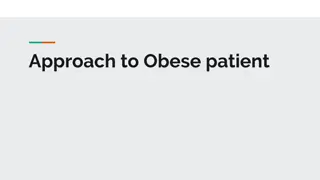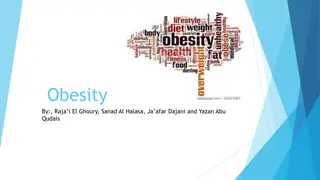Comprehensive Overview of Bariatrics and Pre/Post-Transplant Obesity
Delve into the world of bariatrics and pre/post-transplant obesity with insights on medical weight loss, reasons for bariatric surgery, types of bariatric surgery at VUMC, eligibility criteria for transplant, and the impact of nutrition factors and COVID-19. Learn about specialized medical weight interventions, genetic testing, and the effectiveness of medical weight loss programs in treating high-risk obesity. Discover the reasons for bariatric surgery, including failed weight loss attempts and declining quality of life, and explore the VUMC bariatric surgery options offered.
Download Presentation

Please find below an Image/Link to download the presentation.
The content on the website is provided AS IS for your information and personal use only. It may not be sold, licensed, or shared on other websites without obtaining consent from the author. Download presentation by click this link. If you encounter any issues during the download, it is possible that the publisher has removed the file from their server.
E N D
Presentation Transcript
Bariatrics and Pre/Post Transplant Obesity Jennifer Williams, MPH, RD, CSOWM, LDN Surgical Weight Loss Dietitian October 19, 2021
Agenda Medical Weight Loss Reasons for Bariatric Surgery Types of Bariatric Surgery at VUMC Eligibility/Exclusion Parameters for Transplant Health Benefits - Before & After Nutrition Factors Covid-19 Impact VUMC Surgical Weight Loss Locations
MEDICAL WEIGHT LOSS When pts desire lifestyle intervention and/or the medication route or when BMI does not qualify for bariatric surgery.
Medical Weight Loss Nutrition, lifestyle, and medication Can be explored first, before bariatric surgery Genetic and metabolic testing Pharmaceutical intervention Providers (MDs, NPs, RDs) in MWL loss see ~ 25 patients/year (2020)* for liver transplant alone. *2021 data is currently being analyzed* We know that Specialized medical weight intervention is effective in treating high-risk obesity with complications. Srivastava recently published a retrospective weight loss study should where approximately 50% of [medical weight loss patients reviewed] were able to achieve > 7% weight loss [over the course of 6 months].1 1. Srivastava G, Paris,C, Johnson J, et al. Specialized medical weight management intervention for high-risk obesity. JHEOR. 2021; 8 (2) 1 5. doi:10.36469/jheor.2021.24896
REASONS FOR BARIATRIC SURGERY
Reasons for Bariatric Surgery Obesity, as defined by a BMI > 35 with co-morbidities (DM, HTN, OSA, etc) or BMI > 40 without co-morbidities Multiple failed diet attempts Failed weight loss medication attempts Declining quality of life Co-morbidities directly related to excess weight
TYPES OF BARIATRIC SURGERY AT VUMC
VUMC Bariatric Surgery Options Currently Offered: Roux-en-Y Gastric Bypass (RYGB) Vertical Sleeve Gastrectomy (VSG)* No Longer Offered: Adjustable gastric banding the lap band (AGB) * VSG is typically what is completed on transplant patients, due to concerns with medication absorption.
ELIGIBILITY/ EXCLUSION PARAMETERS FOR TRANSPLANT PTS
General Eligibility All VUMC transplant patient referrals for surgical weight loss are sent to the Vanderbilt Weight Loss Clinic s program coordinator Wendy Tarpley, RN, BSN. There are no exclusions related to solid transplant need at this time. Per Wendy, there is no exclusion for transplant patients because more patients are having the sleeve* to qualify for transplant surgery (BMI must be less than 40).
Eligibility - Steps Pts are screened and then start on the surgical pathway. Surgical consult with MD Telehealth Group Nutrition Education Class (60 minutes) with a Registered Dietitian to teach through nutrition changes required of those choosing Bariatric Surgery - Bariatric Nutrition Guide 1:1 Nutrition Assessment with a RD (1 month after education class) evaluation of progress on nutrition changes Additional Nutrition Reassessment(s) - as clinically required by RD or due to insurance Support Group Attendance Psych Eval Labs, medical clearance, etc.
Eligibility & Follow Through Approximately 7 out of every 10 transplant patient referrals to our surgical weight loss program unfortunately NEVER follow through with the initial consult with the surgeon. - Wendy Tarpley, RN, BSN Bariatric Program Coordinator
HEALTH BENEFITS BEFORE & AFTER
Bariatric Surgery BEFORE When bariatric surgery is initiated before transplant, many risk factors are reduced: Improved glycemic control, reduction or elimination of DM meds, resolution of DM at times Dramatic improvement in BP, discontinuation/reduction in HTN meds Improved mobility Potential ability to halt/delay disease progression, so as to prevent transplant need or how soon a transplant would be required depending on disease state Reduced weight (BMI of < 40), so that surgeon can proceed safely with transplant Improved energy Often, bariatric surgery requirements result in a healthier diet that leads to a more well nourished pt.
Bariatric Surgery AFTER Most studies support waiting a minimum of 1 year AFTER transplant surgery for bariatric surgery to take place, when needed due to obesity. Assistance in achieving a weight that taxes the body less, helping organs to last longer Continued assistance in delaying other disease progressions, co- morbidities All the same benefits as BEFORE - improvement in overall health and quality of life!
SWL - Weight Loss Percentages VSG generally produces a weight loss of 50 60% of excess weight* RYGB generally produces a weight loss of 60 75% of excess weight Weight loss can certainly exceed these levels, but this is what is typical. *Excess weight is defined as the difference between the patient s current weight and the weight that places the patient at a BMI of 25.
NUTRITION FACTORS
Nutrition Macronutrients & micronutrients are monitored through diet recalls with RDs and nutrition labs (week 1 and then months 1, 3, 6, 12, 18 and once a year at 2 years postop bariatric surgery and beyond) The RDs in the weight loss clinics provide guidance, deferring to renal or other specialty providers, as appropriate, to ensure appropriate nourishment with the following: Protein Calories Fat Carbohydrate Fluid & Electrolytes Vitamins and Minerals
Nutrition - Overview Protein Higher % generally (ASMBS guidelines: 60 80 grams/day) Mindful of kidney function (late staged disease/dialysis) protein is modified as appropriate. Calories Initially low at approximately 500/day for first 3 months after WLS; maintenance generally 1000 1200 for women, 1200 1400/1500 for men Fat Typically roughly 30 - 35%, depending on disease state/conditions
Nutrition - Overview Carbohydrate The most variable of the macronutrients, generally fairly low, but may represent up to 40% longer term. Fluid & Electrolytes Normally liberal (> 64 oz+), unless restrictions r/t CHF, dialysis, etc. Limited caffeine (limited to 1 2 cups/day of coffee or equivalent) Electrolytes - levels are monitored by labs and based on s/sx after WLS Vitamins and Minerals Levels are monitored by labs ASMBS compliant supplements are recommended, unless otherwise needed
LONG TERM IMPLICATIONS & CHALLENGES
Potential Long Term Challenges Dumping syndrome Hypoglycemia Malnutrition Ulcers Bowel obstruction/ blockages Transference of addiction (ETOH, exercise, etc)
COVID-19 IMPACT
Covid Impact Internal clinical focus has shifted to safety precautions, telehealth, & additional measures Covid testing prior to surgery All normal VUMC safety practices Limiting numbers in support groups Requiring masking Telehealth = increased access to care! For many this was previously an obstacle. Now, it is a standard way we can schedule and provide care. Normally patients just need to be somewhere within TN borders to receive care from providers in our clinic.
Covid Impact Currently, weight loss interventions through medical or surgical means - may be more conservative than typical. 2 COVID-19 stress and restrictions have been associated with more conservative weight outcomes and higher than typically reported disordered eating.2 Those who have received a transplant and those who have had WLS may be particularly susceptible populations. J.P. Almandoz, L. Xie, J.N. Schellinger, et al.Impact of COVID-19 stay-at-home orders on weight-related behaviours among patients with obesity. Clin Obes, 10 (5) (2020), Article e12386.
VUMC WEIGHT LOSS CLINIC LOCATIONS
VUMC Weight Loss Clinic Locations Vanderbilt Weight Loss Center Vanderbilt Health One Hundred Oaks 719 Thompson Lane, Suite 22200 Nashville, TN 37204 Vanderbilt Weight Loss Center Lebanon 1616 West Main Street, Suite 300 Lebanon, TN 37087 Vanderbilt Surgical Weight Loss Murfreesboro 1272 Garrison Drive, Suite 309 Murfreesboro, TN 37129 Vanderbilt Weight Loss Center Clarksville 800 Weatherly Drive, Suite 201 Clarksville, TN 37043 Call (615) 322-6000 for more information or visit https://www.vanderbilthealth.com/pro gram/surgical-weight-loss Vanderbilt Surgical Weight Loss Jackson 37 Sandstone Circle Jackson, TN 38305
Summary Utilization of weight loss surgery for patients who battle obesity and who are also pre or post-op from transplant, can dramatically IMPROVE health, reduce future health complications and comorbidities, and dramatically increase quality of life!









